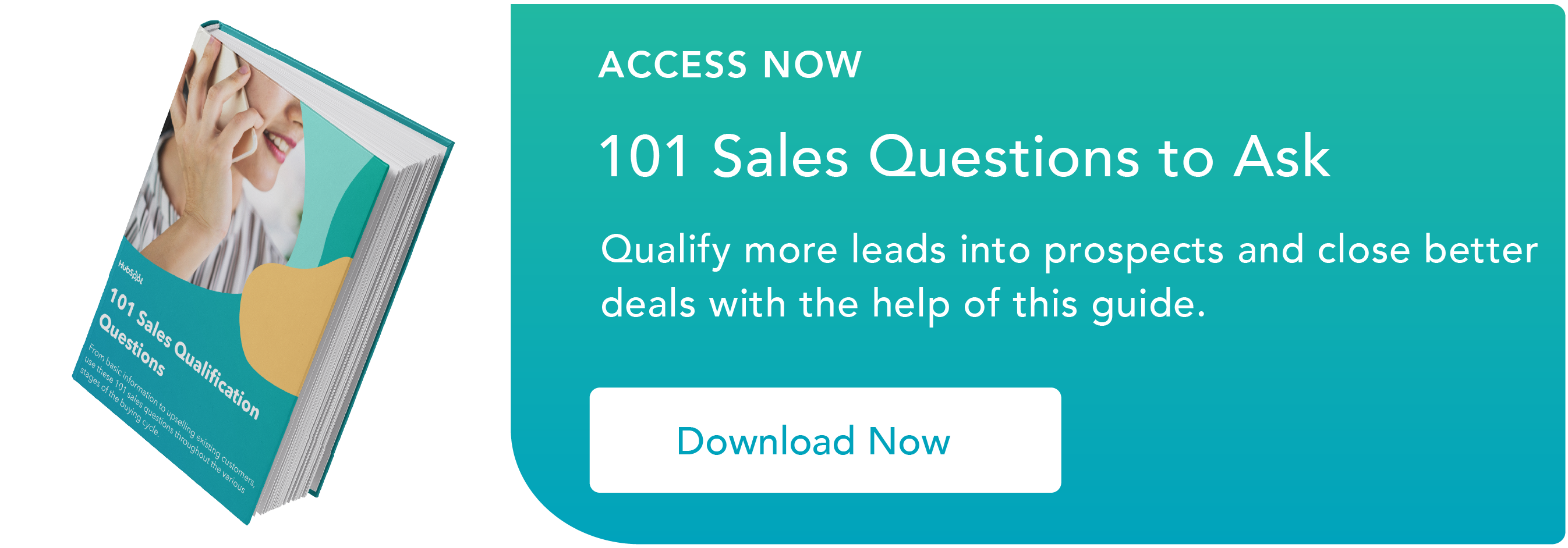A successful career in sales is dependent on your ability to ask good sales discovery questions. To develop that skill, you must know when it's time to dig deeper with probing questions. You know the kind: the type of questions necessary to uncover your prospect's core needs … fast.

In these cases, simply asking, "Tell me about your biggest challenges with your current solution," and moving on isn't enough. You must probe with follow-up questions that will give your prospect the confidence to share the real hurdles they're facing.
What is a probing question?
Probing questions ask for more detail on a particular matter. They’re often follow-up questions like, 'Could you tell me more about that?' or 'Please explain what you mean.' Probing questions are meant to clarify a point or help you understand the root of a problem, so you know how best to move forward.
Here's a comprehensive list of probing sales qualifying questions you can ask buyers to get intimately familiar with their situation and formulate potential solutions. If you'd like my complete list of 450 sales questions for every situation, download this ebook.
And, don't forget: probing questions are as much about listening as they are about speaking. Make sure you're really listening to your prospect's responses, so you know just which question to ask next.
.png)
Free Guide: 101 Sales Qualification Questions
101 Questions to Ask Contacts When Qualifying, Closing, Negotiating, and Upselling.
- Budget Questions
- Business Impact Questions
- Competitor Questions
- And More!
Sales Probing Questions
Use these questions at the beginning of your sales process to identify key information about your prospect. Elaboration is the first step in gaining clarity and context around your prospects' struggles. Once your prospect gives you specific details, you will have more context that will help your client.
- "How can we help?"
- "Could you please give me some background to this?"
- "Can you tell me more about the present situation/problem?"
- "Tell me more about it."
- "How long have you been thinking about this?"
- "Why do you think it is happening?"
- "What goals and objectives do you have for this?"
- "What is your biggest challenge with this?"
- "What are your key objectives with this?"
- "What do you like about your current supplier?"
- "What are you using/doing now?"
- "Do you have any preference with regards to the solution?"
- "What three key outcomes do you want from this?"
- "Can you please tell me about that?"
- "Can you give me an example?"
- "Can you be more specific?"
- "How does this look/sound/feel to you?"
- "Why are you seeking to do this work/project/engagement?"
Questions For Identifying Symptoms For Big-Picture Problems
The following sales questions are designed to help you identify the barriers your prospect is facing. Understanding what, how, and how long these issues have been present will help you get to the root of the problem.
The root of these barriers are more than likely showing up in other areas in their business or personal development. These questions will help you to identify which issues need to be addressed first.
- "Why isn’t this particular service/product/situation/issue working for you right now?"
- "How long has it been an issue/problem?"
- "Why do you think the issue/problem has been going on for so long?"
- "How much longer can you afford to have the problem go unresolved?"
- "How is it impacting your organization/customers/staff?"
- "How severe is the problem?"
- "When do you need the issue/problem fixed by?"
- "Why have you been dealing with this for so long?"
- "What bothers you the most about this situation/issue/problem?"
- "What has prevented you from fixing this in the past?"
- "What kind of timeframe are you working in to fix this?"
- "How long have you been thinking about it?"
- "Is this problem causing other problems?"
- "Does your competition have these problems?"
- "What is the biggest problem that you are facing with this?"
- "What other problems are you experiencing?"
- "What alternatives have you considered?"
- "What are the intangible effects of the problem?"
- "Does the issue cause problems with employee morale?"
- "Does the issue cause problems that negatively affect the motivation of your staff?"
- "Can this problem affect productivity?"
- "Is this problem unique to your organization?"
- "Is this an industry-wide problem?"
- "Is it regional or geographical?"
- "When you went to your existing supplier and shared your frustrations about this problem, what reassurances did they give you that it wouldn’t be repeated?"
- "How did these problems/issues first come about? What were the original causes?"
- "What have you done in the past to address the problem?"
- "Does this affect other parts of the business?"
- "What kind of pressure is this causing you and the business?"
- "What options have you tried?"
- "What are the long-term effects of the problem?"
- "How does the problem ultimately affect your current customers?"
- "How does the problem ultimately affect your prospective customers?"
- "How does the problem ultimately affect your sales teams?"
- "How does the problem ultimately affect your other employees?"
- "How does the problem ultimately affect your sales process?"
- "How does the problem ultimately affect your reputation/goodwill/brand?"
- "Do you feel this problem/issue has given your competition a competitive advantage? If so, how?"
- "Who did you work with last time and why?"
- "How often do you think the problem has come up when you weren’t aware of it?"
- "What are the long-term effects of the problem? If you were in your competitors’ shoes, how would you take advantage of this?"
- "Do you know what your competition is thinking/planning about this?"
- "Do they suffer from the same problem?"
- "Does this affect other parts of the business?"
Action-Oriented Probing Questions
Once you have context of your prospect’s barriers, knowing what action your prospect should take is key. These questions will help your prospect see the pathway to improving their business and will also establish trust between you and them. Each question helps your prospect identify action steps that will help the two of you formulate the right solutions.
- "What number would you put on this issue in terms of prioritization?"
- "How much more productive could your people be if the problem did not exist?"
- "If you were your competition, what would you do right now?"
- "If you could design the perfect solution, what would it look like, how much would you spend, and how long would it go for?"
- "What sense of urgency do you have here?"
- "What three key outcomes do you want from solving the problem?"
- "What are your top three requirements that this solution just has to have?"
- "If you could have things the way you wanted, what would it look like?"
- "What are you using/doing now?"
- "How important is this need (on a scale of 1-10)?"
- "What options are you currently looking at?"
- "In a perfect world, what would you like to see happen with this?"
- "What is your strategy to fix this problem?"
- "What are you currently doing to address the problem?"
.png)
Free Guide: 101 Sales Qualification Questions
101 Questions to Ask Contacts When Qualifying, Closing, Negotiating, and Upselling.
- Budget Questions
- Business Impact Questions
- Competitor Questions
- And More!
Financial Probing Questions
Revenue drives decisions for most businesses. These questions will give you a deeper understanding of where your prospect may be hesitant to move forward or why they have been making certain choices around money.
Asking these questions will deepen your analysis on what financial barriers your prospect is facing. Since money is a more sensitive topic, you should transition into these questions once you feel like you’ve established a sense of trust with your prospect.
- "What is it costing you?"
- "Do you know in what other areas the problem is costing you money?"
- "Can you put an amount on the problem in terms of cost: Weekly, monthly, annually?"
- "Can you see how much money you/your organization loses every day by not solving this issue?"
- "How does the problem ultimately affect your pricing/selling costs?"
- "How much does this problem cost you in man hours/time?"
- "Looking at this from a point of lost sales, how much is just one sale worth to the company?"
- "How much is the issue/problem costing you in time/money/resources/staff/energy?"
- "Can you make an educated guess as to how much it costs you?"
- "What kind of return or payoff will you be looking for if you get a successful resolution of the problem?"
- "What are you working with at the moment? Just a ball park... "
- "How do you handle budget considerations?"
Accountability and Clarity Probing Questions
These questions solidify your understanding of your prospect’s position by delving further into the details. This also helps your prospect get clear on all the issues that will be addressed while they work with you. These questions will be good to wrap up your sales session and finalize your scope of work.
- "Who is ultimately responsible for this?"
- "Why are you seeking to do this work/project/engagement?"
- "Who else is aware of it?"
- "What has made you want to look into this now?"
- "What kind of timeframe are you working within?"
- "Is there anything I have overlooked?"
- "Have I covered everything?"
- "What alternatives have you considered?"
- "Do you have any questions you’d like to ask me?"
- "What other factors have we not discussed that are important to you?"
- "Are there any other areas I haven’t asked you about that are important?"
- "What else should I know?"
- "Have I asked you about every detail that’s important to you?"
- "How soon would you like to move with this?"
- "Does this affect other parts of the business?"
- "What’s your role in this situation/issue/problem?"
- "Who supports this action?"
An Effective Sale Strategy Means Asking The Right Questions
If you want to make your sales process effective for you and your prospect, this list of probing questions is guaranteed to help. Asking questions that aid your understanding of your prospect will increase the chances of closing the sale. Demonstrating the will to listen to pain points, barriers, and deadlines are crucial for an effective sales meeting.
These probing questions are designed to help you get the right information. They will prompt your prospect to take action and help them visualize how to close the gap between where they are and where they want to be.
Editor's note: This post was originally published in September 2015 and has been updated for comprehensiveness.
![Free Download: 101 Sales Qualification Questions [Access Now]](https://no-cache.hubspot.com/cta/default/53/e97d6603-b40e-4085-ad55-0074b7351ead.png)

![How to Use BANT to Qualify Prospects in 2024 [Expert Tips]](https://blog.hubspot.com/hubfs/bant-questions-6606f7b6c0d9e.webp)



![21 Signs Your Buyer Is a Poor Fit [Sales Process Checklist], According to HubSpot's Former Sales Director](https://blog.hubspot.com/hubfs/Bad%20fit%20checklist.jpg)




